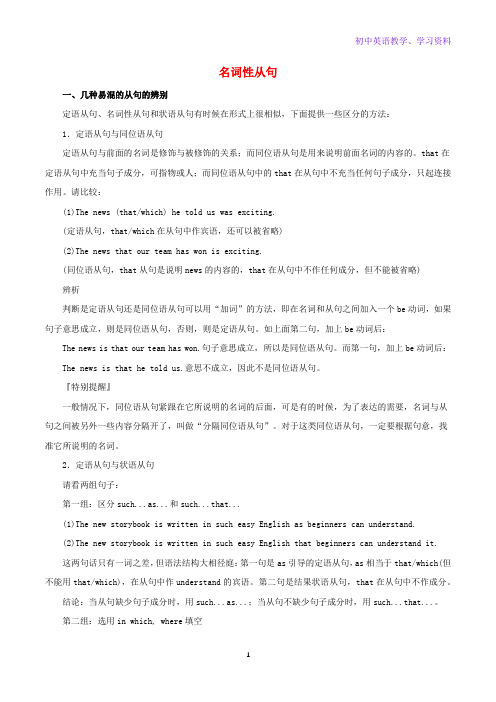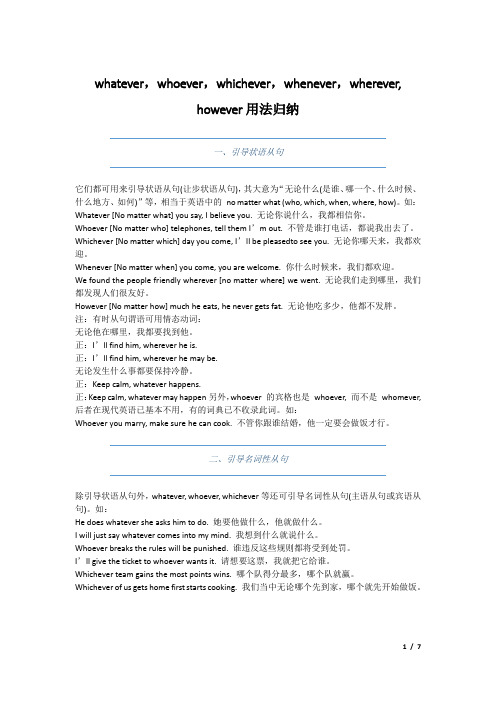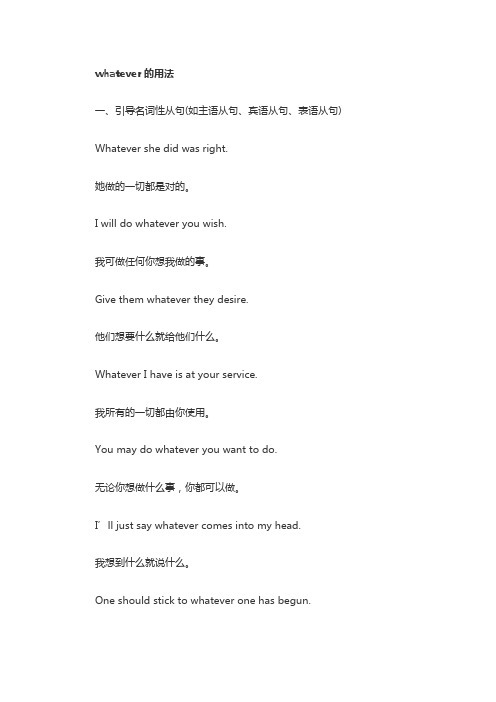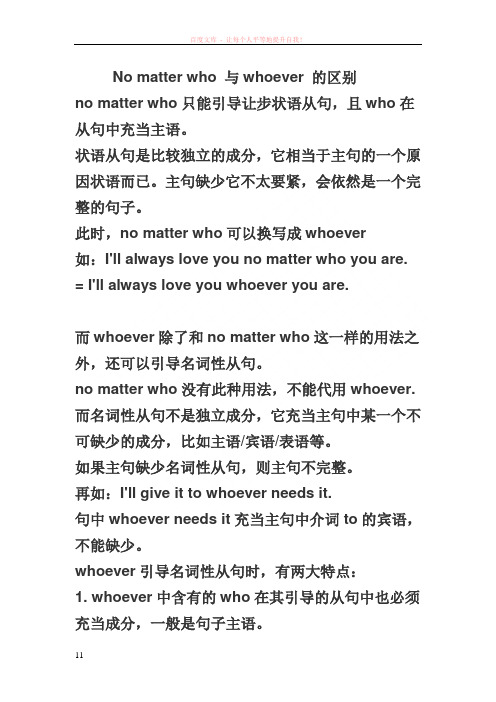名词性从句whoever与no matter who有何区别
2021年高考英语二轮复习名词性从句考点讲解含解析

名词性从句一、几种易混的从句的辨别定语从句、名词性从句和状语从句有时候在形式上很相似,下面提供一些区分的方法:1.定语从句与同位语从句定语从句与前面的名词是修饰与被修饰的关系;而同位语从句是用来说明前面名词的内容的。
that在定语从句中充当句子成分,可指物或人;而同位语从句中的that在从句中不充当任何句子成分,只起连接作用。
请比较:(1)The news (that/which) he told us was exciting.(定语从句,that/which在从句中作宾语,还可以被省略)(2)The news that our team has won is exciting.(同位语从句,that从句是说明news的内容的,that在从句中不作任何成分,但不能被省略)辨析判断是定语从句还是同位语从句可以用“加词”的方法,即在名词和从句之间加入一个be动词,如果句子意思成立,则是同位语从句,否则,则是定语从句。
如上面第二句,加上be动词后:The news is that our team has won.句子意思成立,所以是同位语从句。
而第一句,加上be动词后:The news is that he told us.意思不成立,因此不是同位语从句。
『特别提醒』一般情况下,同位语从句紧跟在它所说明的名词的后面,可是有的时候,为了表达的需要,名词与从句之间被另外一些内容分隔开了,叫做“分隔同位语从句”。
对于这类同位语从句,一定要根据句意,找准它所说明的名词。
2.定语从句与状语从句请看两组句子:第一组:区分such...as...和such...that...(1)The new storybook is written in such easy English as beginners can understand.(2)The new storybook is written in such easy English that beginners can understand it.这两句话只有一词之差,但语法结构大相径庭:第一句是as引导的定语从句,as相当于that/which(但不能用that/which),在从句中作understand的宾语。
whatever,whoever,whichever,whenever,wherever, however用法归纳

whatever,whoever,whichever,whenever,wherever,however用法归纳一、引导状语从句它们都可用来引导状语从句(让步状语从句),其大意为“无论什么(是谁、哪一个、什么时候、什么地方、如何)”等,相当于英语中的no matter what (who, which, when, where, how)。
如:Whatever [No matter what] you say, I believe you. 无论你说什么,我都相信你。
Whoever [No matter who] telephones, tell them I’m out. 不管是谁打电话,都说我出去了。
Whichever [No matter which] day you come, I’ll be pleasedto see you. 无论你哪天来,我都欢迎。
Whenever [No matter when] you come, you are welcome. 你什么时候来,我们都欢迎。
We found the people friendly wherever [no matter where] we went. 无论我们走到哪里,我们都发现人们很友好。
However [No matter how] much he eats, he never gets fat. 无论他吃多少,他都不发胖。
注:有时从句谓语可用情态动词:无论他在哪里,我都要找到他。
正:I’ll find him, wherever he is.正:I’ll find him, wherever he may be.无论发生什么事都要保持冷静。
正:Keep calm, whatever happens.正:Keep calm, whatever may happen另外,whoever 的宾格也是whoever, 而不是whomever, 后者在现代英语已基本不用,有的词典已不收录此词。
whoever和no matter who的区分

让步状语从句no matter + what(who,which,when,etc.)与whatever (whoever,whichever,whenever,etc.)的区别:当引导让步状语从句时,两者相同,可以互换,但当引导名词性从句(主语从句,宾语从句,表语从句和同位语从句)时则只能用whatever(whoever,whichever,whenever,etc)。
如:1. However/No matter how beautiful the bag looks; I do not want to buy it.2. I don’t want to change my idea ,whoever/no matter who persuades me.下面句子不能用no matter结构(no matter结构不能引导名词性从句):1.Whoever disobey the rules is supposed to be punished.(主语从句)2. I am ready to do whatever my parents want me to .(宾语从句)3. The problem is whoever will be willing to volunteer to answer my questions. (表语从句)4. I don’t agree to the idea whoever can share the room with me.例证:5. Whatever my mother did, I will accept. 让步状语从句.6. I will accept whatever my mother did. 宾语从句.总之,对于二者的区分,从例子中获取。
Whatever you say, I will not believe you.(让步状语从句);I will see whatever you show me.(名词性从句)。
whatever的详细用法总结

whatever的用法一、引导名词性从句(如主语从句、宾语从句、表语从句) Whatever she did was right.她做的一切都是对的。
I will do whatever you wish.我可做任何你想我做的事。
Give them whatever they desire.他们想要什么就给他们什么。
Whatever I have is at your service.我所有的一切都由你使用。
You may do whatever you want to do.无论你想做什么事,你都可以做。
I’ll just say whatever comes into my head.我想到什么就说什么。
One should stick to whatever one has begun.开始了的事就要坚持下去。
She would tell him whatever news she got.她得到的任何消息都会告诉他。
I’m going to learn whatever my tutor wishes.我将学习任何我的导师愿意我学的东西。
College students are seen doing whatever work they can find. 我们可以看到,只要有工作,大学生们什么都干。
Do whatever she tells you and you'll have peace.她叫你干什么你就干什么,那你就太平了。
二、是用于引导让步状语从句Whatever we said, he'd disagree.无论我们说什么,他都不同意。
Whatever happened I must be calm.不管发生什么情况我都要镇静。
We’ll go along together whatever happens.不管发生什么情况我们都要起干。
Don’t lose heart whatever difficulties you meet.不管遇到什么困难都不要灰心。
nomatterwho与whoever的区别

No matter who 与whoever 的区别no matter who只能引导让步状语从句,且who在从句中充当主语。
状语从句是比较独立的成分,它相当于主句的一个原因状语而已。
主句缺少它不太要紧,会依然是一个完整的句子。
此时,no matter who可以换写成whoever如:I'll always love you no matter who you are. = I'll always love you whoever you are.而whoever除了和no matter who这一样的用法之外,还可以引导名词性从句。
no matter who没有此种用法,不能代用whoever. 而名词性从句不是独立成分,它充当主句中某一个不可缺少的成分,比如主语/宾语/表语等。
如果主句缺少名词性从句,则主句不完整。
再如:I'll give it to whoever needs it.句中whoever needs it充当主句中介词to的宾语,不能缺少。
whoever引导名词性从句时,有两大特点:1. whoever中含有的who在其引导的从句中也必须充当成分,一般是句子主语。
如例句中的whoever在从句中就充当主语,即needs it的主语。
2. whoever既在名词性从句中充当成分,且其引导的从句并不指代一件事情,而是指代“...的人”。
3. whoever此时可以换写成anybody who,将名词性从句转换成定语从句,这样更容易理解。
如:I’ll give it to (whoever needs it).= I'll give it to (anybody who) needs it.= I'll give it to anybody (who needs it).。
whatever用法

whatever用法whatever,whoever,whichever,whenever,wherever, however用法归纳一、引导状语从句它们都可用来引导状语从句(让步状语从句),其大意为“无论什么(是谁、哪一个、什么时候、什么地方、如何)”等,相当于英语中的no matter what (who, which, when, where, how)。
如:Whatever [No matter what] you say, I believe you. 无论你说什么,我都相信你。
Whoever [No matter who] telephones, tell them I’m out. 不管是谁打电话,都说我出去了。
Whichever [No matter which] day you come, I’ll be pleasedto see you. 无论你哪天来,我都欢迎。
Whenever [No matter when] you come, you are welcome. 你什么时候来,我们都欢迎。
We found the people friendly wherever [no matter where] we went. 无论我们走到哪里,我们都发现人们很友好。
However [No matter how] much he eats, he never gets fat. 无论他吃多少,他都不发胖。
注:有时从句谓语可用情态动词:无论他在哪里,我都要找到他。
正:I’ll find him, wherever he is.正:I’l l find him, wherever he may be.无论发生什么事都要保持冷静。
正:Keep calm, whatever happens.正:Keep calm, whatever may happen另外,whoever 的宾格也是 whoever, 而不是whomever, 后者在现代英语已基本不用,有的词典已不收录此词。
however与no-matter-how的区别

“疑问词+ ever ”可分为两类,“疑问代词+ ever ”:whatever / whichever / whoever (宾格whomever )和“疑问副词+ ever ”:wherever / whenever / however.不论是“疑问代词+ ever ”还是“疑问副词+ ever ”,其意义都是“不管/ 无论+ 该疑问词的本义”。
1. “疑问代词+ ever”可引导两种类型的从句,即让步状语从句和名词性从句(主语从句、宾语从句)。
(1)引导让步状语从句。
此时whatever / whoever / whichever 分别等于“ no matter + what / who / which”。
例如:Whatever happened / No matter what happened,he wouldn't say a word.. Whoever says so / No matter who says so, it is wrong.Whichever / No matter which dictionary you (may)take,you will have to pay at least 20 dollars.注意:这类从句中应用一般现在时表将来,从句中也常用情态动词may / might . (2)引导名词性从句。
例如:Whoever smokes here will be punished. (主语从句)Beggars will eat whatever they are given. (宾语从句)Whichever he likes will be given to him. (主语从句)You may invite whoever / whomever you like. (常用whoever 代替whomever)此时它们都不能换成“ no matter + 疑问词”的形式,但whoever 等于anyone who,whatever 等于anything that.2. “疑问副词+ever ”:wherever / whenever / however 一般只能引导一种类型的从句,即让步状语从句,此时它们分别等于“ no matter + where / when / how ”。
疑问词+ever和no matter的用法

主语从句用法详解(例句丰富)一、主语从句的引导词主语从句通常由连词that和whether、连接代词或连接副词以及关系代词型what引导。
1. that引导That he is still alive is a wonder. 他还活着,真是奇迹。
That we shall be late is certain. 我们要晚了,这是确定无疑的。
That he should have ignored the working class was natural. 他忽视工人阶级是很自然的。
That she is still alive is a consolation. 她还活着是使人感到宽慰的。
That she became an artist may have been due to her father’s influence. 她成为画家可能是受她父亲的影响。
That you are coming to London is the best news I have heard this long time. 你将来伦敦是好久以来我听到的最好消息。
That she was chosen made a tremendous stir in her village. 她被挑选上,在她村子里引起很大轰动。
2. whether引导Whether it will do us harm remains to be seen. 是否对我们有害还要看一看。
Whether they would support us was a problem. 他们是否会支持我们还是一个问题。
3. 连接代词引导Whoever is top from wins the game when two matched players meet. 两强相争勇者胜。
Whichever (of you) comes in first will receive a prize. 无论(你们)谁先到都可以得奖。
- 1、下载文档前请自行甄别文档内容的完整性,平台不提供额外的编辑、内容补充、找答案等附加服务。
- 2、"仅部分预览"的文档,不可在线预览部分如存在完整性等问题,可反馈申请退款(可完整预览的文档不适用该条件!)。
- 3、如文档侵犯您的权益,请联系客服反馈,我们会尽快为您处理(人工客服工作时间:9:00-18:30)。
whoever与no matter who有何区别有这样一道题:I will give the ticket to __________ wants it.A. whoeverB. no matter whoC. whateverD. no matter what此题应选 A。
容易误选B。
选项C,D都是错的,因为从句意上看,“想要票的”应该是“人”(whoever)而不能是“东西”(whatever)。
至于为什么选 whoever 而不选no matter who,这要从它们在句中引导的成分说起:no matter who通常只能引导状语从句,而不能引导名词性从句。
而 whoever 既可引导名词性从句(= anyone that)也可引导状语从句(=no matter who):如何理解宾语从句的时态呼应理解宾语从句的时态响应,应注意以下几种情况:1. 无需呼应的情况:若主句谓语动词的时态为现在时或将来时,宾语从句的谓语动词可根据句意的需要使用任何所需要的时态。
如:He knows where they live. 他知道他们住哪里。
No one knows where he was born. 没有人知道他出生于何地。
Tom says that he’ll never get married. 汤姆说他永远不结婚。
2. 主句为过去时的情况:若主句谓语动词为过去时,宾语从句的谓语动词应用相应的过去时态。
如:She asked me if I’d slept well. 她问我睡得好不好。
I didn’t know whether they liked the place. 我不知道他们是否喜欢这个地方。
He said he was going to accompany her home. 他说他将陪她回家。
当主句谓语动词为过去时,即使宾语从句所表示的时间是现在,通常也用过去时。
如:Oh! I didn’t know you were here. 啊! 我不知道你在这里。
(you were here指说话的当时)Hello! I didn’t know you were in London. How long have you been here? 你好! 我不知道你在伦敦。
你来这里多久了? (you were in London其实是指说话的当时)当然,为避免误会,我们也可以直接使用现在时态或将来时态来表示现在或将来要发生的情况,而无需考虑与主句谓语的过去时相呼应。
如:She said she’ll be back tonight. 她说她今晚回来。
He said that the meeting is Tuesday. 他说会议于星期二举行。
3. 从句为客观真理的情况:当宾语从句的内容是客观真理或客观事实,可以不受时态呼应的限制,即使主句谓语动词为过去时,从句仍用一般现在时。
如(www.yygrammar.co m):The teacher told the students that light travels faster than sound. 老师告诉学生,光的速度比声速快。
When we were children, we were told that China is in the east of the world. 我们还是小孩子的时候,人们就告诉我们说中国在世界的东方。
关于引导宾语从句that的省略问题在通常情况下,引导宾语从句的连词that 是可以省略的。
如:I know (that) she is under thirty. 我知道她不到三十岁。
I think (that) Diana will pass the exam. 我想戴安娜考试会及格的。
She says (that) she is coming to London next week. 她说她下周要来伦敦。
但在以下几种特殊情况,引导宾语从句的连词that 不能省略:1. 当为了强调把that引导的宾语从句可位于句首时,that不能省略。
如:That she is a good girl I know. 她是一个好姑娘,我是知道的。
That he ever said such a thing I simply don’t believe. 我简直不相信他曾说过这样的话。
2. 当that从句与动词被其他词或从句隔开时,that一般不宜省略,以免造成语义混乱。
如:They told us once again that the situation was serious.他们又一次告诉我们说形势是严重的。
The dealer told me how much he was prepared to pay for my car and that I could have the mo ney without delay. 那个商人告诉我他准备出多少钱买我的汽车,并说我会立即收到款。
3. 当两个或多个that引导的宾语从句并列使用时,即使省略了第一个从句的引导词tha t,后面的that也不可省略。
如:He said (that) he couldn’t tell you right away and that you wouldn’t understand. 他说他不能马上告诉你,你是不会理解的。
()He said (that) it wasn’t his business and that the government should do something about it. 他说这不关他的事,而是政府应该对这事想点办法。
4当主句与宾语从句之间插有其他成分时引导宾语从句的that通常不能省略。
如。
如:◆她答应要是谁找到他的儿子,她会给他一大笔钱。
正:She promised (that) she would give him a lot of money if anyone found her son.正:She promised that if anyone found her son she would give him a lot of money误:She promised if anyone found her son she would give him a lot of money◆他说等他妻子回来,他就离开。
这个宾语从句用who还是whoever引导有这样一道题,这个宾语从句该用什么来引导?who 还是 whoever?I won’t go there alone, and I’ll take _________ wants to go.A. anyoneB. whoC. whoeverD. what【分析】此题应选C,容易误选A或B,误选的原因主要是直接按中文意思套译,即将其译为“我不会一个人去,谁想去我就带谁去”。
当然若将A, B两项合起来(即anyone who)则也正确。
选项 C(whoever) 引导一个宾语从句,用作 take 的宾语。
同样地,请看以下类似试题:(1) _________ comes is welcome.A. AnyoneB. WhoC. Anyone whoD. Everyone【分析】此题很容易误选A,因为从汉语意思来分析,可理解为“任何人来都是欢迎的”,但若选A,此句的结构是混乱的,句中有两个谓语动词comes 和is,但却只是一个句子。
此题应选C,anyone 是句子主语,who comes 是修饰 anyone 的定语从句。
(2) _________ comes to see me, tell him I’m out.A. AnyoneB. WhoC. WhoeverD. Everyone【分析】此题很容易按汉语意思误选A,其实应选C。
whoever 引导的是让步状语从句,相当于 no matter who。
(3) Sarah hopes to become a friend of _________ shares her interests.A. anyoneB. whomeverC. whoeverD. no matter who【分析】此题不能选A,假若选A,应在其后加上who,即用anyone who;也不能选B,一是因为空格处应填一个作主语的词(因为其后有谓语动词shares),二是因为在现代英语中whomever 这个词已基本废除(也就是说,在现代英语中 whoever 既用作主语,也用作宾语,如:Give it to whoever you see in the meeting-room. 你在会议室里看见谁就把它给谁);也不能选D,因为no matter who只用于引导让步状语从句,不用于引导名词性从句。
此题正确答案为C,whoever 在此相当于 anyone who。
比较下例,答案应选A,而不是B、C或D(注意句意):It was a matter of _________ would take the position.A. whoB. whoeverC. whomD. whomever1. what 引导名词从句时,它在从句中要充当句子成分(主语、宾语等),而 that 引导名词从句时,它在从句中不能充当句子成分。
2. what 引导名词从句时,它有词义(表示:什么;所……的[东西]);而 that 引导名词从句时,它没有词义。
请做以下试题,注意区别 what 和 that。
如:1. ________ you said is different from the thing ________he told us.A. What, whatB. That, thatC. What, thatD. That, what2.—I think ________ he said is true.()—But don’t forget the fact ________he is a cheat.A. what, whatB. that, thatC. what, thatD. that, what3. ________ surprised us most is ________he spoke English so well.A. What, whatB. That, thatC. What, thatD. That, what答案:1. C 2. C 3. C如何区别引导名词从句的whether与thatwhether与that均可引导名词从句,该如何区别呢?__________ we’ll go camping tomorrow depends on the weather.A. IfB. WhetherC. ThatD. When此题应选 B。
